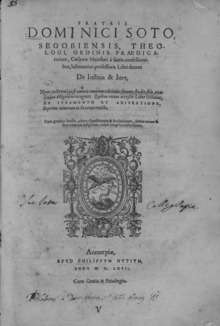Domingo de Soto


Domingo de Soto (1494 – November 15, 1560) was a Dominican priest and Scholastic theologian born in Segovia, Spain, and died in Salamanca at the age of 66. He is best known as one of the founders of international law and of the Spanish Thomistic philosophical and theological movement known as the School of Salamanca.
Trained in Alcalá, Spain, and Paris, France, before being made professor of Philosophy at Alcalá in 1520, he left academia in 1524 to join the Dominicans and returned to take the chair of theology at Salamanca University in 1532.[1] He is best known in economic theory and theological circles for his writings defending the price differential in usury as compatible with "just price" from the perspective of the Thomists.
He held powerful positions including Confessor of Holy Roman Emperor Charles V and the emperor's representative at the Council of Trent.
In 1556, Soto published a treatise on law, De Justitia and Jure (Justice and the Law) that is considered a foundational text in the general theory of international law. Like his teacher Francisco de Vitoria, Soto condemned the Spanish conquests in the New World.[2]
In the 20th century, Pierre Duhem credited him with important achievements in dynamics and viewed his work as a forerunner of modern mechanics.[3][4]
Works
- Summulae, 1529. (A manual of logic.)
- De ratione tegendi et detegendi secretum, 1541
- In dialecticam Aristotelis commentarii, 1544
- In VIII libros physicorum, 1545 (An influential commentary on Aristotle's Physics.)
- Deliberacion en la causa de los pobres, 1545
- De natura et gratia libri III, 1547 (A treatise on original sin and grace, written from a Thomistic point of view.)
- Comment. in Ep. ad Romanos, 1550
- In IV sent. libros comment. 1555-6.
- De justitia et jure libri X, 1556 (A treatise on law.)
Notes
- ↑
 Herbermann, Charles, ed. (1913). "Dominic Soto". Catholic Encyclopedia. New York: Robert Appleton Company.
Herbermann, Charles, ed. (1913). "Dominic Soto". Catholic Encyclopedia. New York: Robert Appleton Company. - ↑ Hamilton, Bernice. (1963) Political Thought in Sixteenth-Century Spain. Oxford Clarendon Press, p. 179.
- ↑ Duhem, Pierre (1913). Etudes sur Léonard de Vinci (in French). 3. Hermann. OCLC 612509355.
- ↑ Wallace, William A. (2004). Domingo de Soto and the Early Galileo. Aldershot: Ashgate Publishing. ISBN 0-86078-964-0.